 W
WRuss Biagio Altman is an American professor of bioengineering, genetics, medicine, and biomedical data science and past chairman of the bioengineering department at Stanford University.
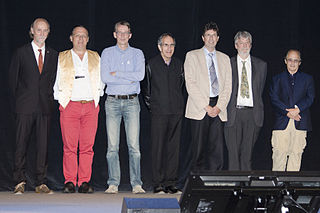 W
WRolf Apweiler is a director of European Bioinformatics Institute (EBI) part of the European Molecular Biology Laboratory (EMBL) with Ewan Birney.
 W
WMichael Ashburner is a biologist and Emeritus Professor in the Department of Genetics at University of Cambridge. He is also the former joint-head and co-founder of the European Bioinformatics Institute (EBI) of the European Molecular Biology Laboratory (EMBL) and a Fellow of Churchill College, Cambridge.
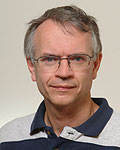 W
WAmos Bairoch is a Swiss bioinformatician and Professor of Bioinformatics at the Department of Human Protein Sciences of the University of Geneva where he leads the CALIPHO group at the Swiss Institute of Bioinformatics (SIB) combining bioinformatics, curation, and experimental efforts to functionally characterize human proteins.
 W
WAlexander George Bateman is a computational biologist and Head of Protein Sequence Resources at the European Bioinformatics Institute (EBI), part of the European Molecular Biology Laboratory (EMBL) in Cambridge, UK. He has led the development of the Pfam biological database and introduced the Rfam database of RNA families. He has also been involved in the use of Wikipedia for community-based annotation of biological databases.
 W
WBonnie Anne Berger is an American mathematician and computer scientist, who works as the Simons professor of mathematics and professor of electrical engineering and computer science at the Massachusetts Institute of Technology. Her research interests are in algorithms, bioinformatics and computational molecular biology.
 W
WHelen Miriam Berman is a Board of Governors Professor of Chemistry and Chemical Biology at Rutgers University and a former director of the RCSB Protein Data Bank. A structural biologist, her work includes structural analysis of protein-nucleic acid complexes, and the role of water in molecular interactions. She is also the founder and director of the Nucleic Acid Database, and led the Protein Structure Initiative Structural Genomics Knowledgebase.
 W
WJohn Frederick William Birney is joint director with Rolf Apweiler of EMBL's European Bioinformatics Institute (EMBL-EBI), in Hinxton, Cambridgeshire and deputy director general of the European Molecular Biology Laboratory (EMBL). He also serves as non-executive director of Genomics England, chair of the Global Alliance for Genomics and Health (GA4GH) and honorary professor of bioinformatics at the University of Cambridge. Birney has made significant contributions to genomics, through his development of innovative bioinformatics and computational biology tools. He previously served as an associate faculty member at the Wellcome Trust Sanger Institute.
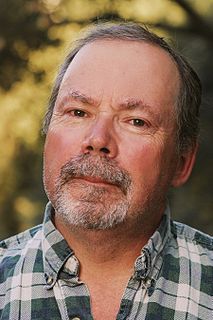 W
WPhilip Eric Bourne is an Australian bioinformatician, non-fiction writer, and businessman. He is currently Stephenson Chair of Data Science and Director of the School of Data Science and Professor of Biomedical Engineering and was the first associate director for Data Science at the National Institutes of Health, where his projects include managing the Big Data to Knowledge initiative, and formerly Associate Vice Chancellor at UCSD. He has contributed to textbooks and is a strong supporter of open-access literature and software. His diverse interests have spanned structural biology, medical informatics, information technology, structural bioinformatics, scholarly communication and pharmaceutical sciences. His papers are highly cited, and he has an h-index above 50.
 W
WSteven Elliot Brenner is a professor at the Department of Plant and Microbial Biology at the University of California Berkeley, Adjunct Professor at the Department of Bioengineering and Therapeutic Sciences at the University of California, and San Francisco Faculty Scientist, Physical Biosciences at the Lawrence Berkeley National Laboratory.
 W
WSøren Brunak is a Danish biological and physical scientist working in bioinformatics, systems biology and medical informatics. He is professor of Disease Systems Biology at the University of Copenhagen and professor of Bioinformatics at the Technical University of Denmark. As Research Director at the Novo Nordisk Foundation Center for Protein Research at the University of Copenhagen Medical School he leads a research effort where molecular level systems biology data are combined with phenotypic data from the healthcare sector, such as electronic patient records, registry information and biobank questionnaires. A major aim is to understand the network biology basis for time-ordered comorbidities and discriminate between treatment related disease correlations and other comorbidities in disease trajectories. Søren Brunak also holds a position as Medical Informatics Officer at Rigshospitalet, Capital Region of Denmark.
 W
WCyrus Homi Chothia was an English biochemist who was an emeritus scientist at the Medical Research Council (MRC) Laboratory of Molecular Biology (LMB) at the University of Cambridge and emeritus fellow of Wolfson College, Cambridge.
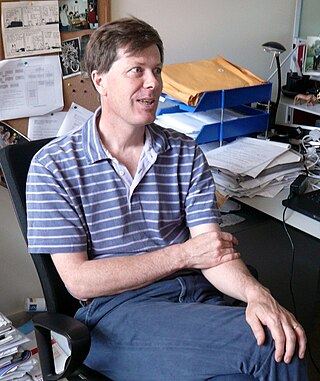 W
WRichard Michael Durbin, FRS, born 30 December 1960, is a British computational biologist. He is currently an Associate Faculty member at the Wellcome Trust Sanger Institute and Professor of Genetics at the University of Cambridge. Previously, he was Senior Group Leader at the Wellcome Trust Sanger Institute for over 20 years and an Honorary Professor of Computational genomics at the University of Cambridge.
 W
WDavid S. Eisenberg is an American biochemist and biophysicist best known for his contributions to structural biology and computational molecular biology, a professor at the University of California, Los Angeles since the early 1970s and director of the UCLA-DOE Institute for Genomics & Proteomics since the early 1990s, as well as a member of the California NanoSystems Institute (CNSI) at UCLA.
 W
WRobert Clifford Gentleman is a Canadian statistician and bioinformatician who is currently the founding executive director of the Center for Computational Biomedicine at Harvard Medical School. He was previously vice president of computational biology at 23andMe. Gentleman is recognized, along with Ross Ihaka, as one of the originators of the R programming language and the Bioconductor project.
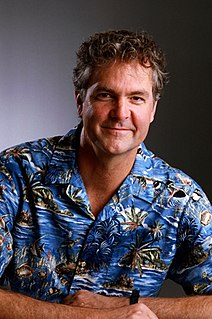 W
WDavid Haussler is an American bioinformatician known for his work leading the team that assembled the first human genome sequence in the race to complete the Human Genome Project and subsequently for comparative genome analysis that deepens understanding the molecular function and evolution of the genome.
 W
WProfessor Nils Gunnar Hansson von Heijne, born 10 June 1951 in Gothenburg, is a Swedish scientist working on signal peptides, membrane proteins and bioinformatics at the Stockholm Center for Biomembrane Research at Stockholm University.
 W
WDesmond Gerard Higgins is a Professor of Bioinformatics at University College Dublin, widely known for CLUSTAL, a series of computer programs for performing multiple sequence alignment. According to Nature, Higgins' papers describing CLUSTAL are among the top ten most highly cited scientific papers of all time.
 W
WLawrence E. Hunter is a Professor and Director of the Center for Computational Pharmacology and of the Computational Bioscience Program at the University of Colorado School of Medicine and Professor of Computer Science at the University of Colorado Boulder. He is an internationally known scholar, focused on computational biology, knowledge-driven extraction of information from the primary biomedical literature, the semantic integration of knowledge resources in molecular biology, and the use of knowledge in the analysis of high-throughput data, as well as for his foundational work in computational biology, which led to the genesis of the major professional organization in the field and two international conferences.
 W
WJanet Kelso is a South African computational biologist and Group leader of the Minerva Research Group for Bioinformatics at the Max Planck Institute for Evolutionary Anthropology.
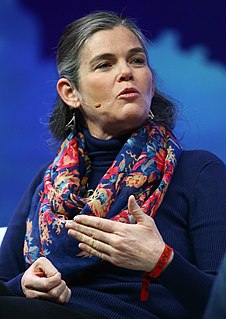 W
WDaphne Koller is an Israeli-American computer scientist. She has been a Professor in the Department of Computer Science at Stanford University and a MacArthur Fellowship recipient. She is one of the founders of Coursera, an online education platform. Her general research area is artificial intelligence and its applications in the biomedical sciences. Koller was featured in a 2004 article by MIT Technology Review titled "10 Emerging Technologies That Will Change Your World" concerning the topic of Bayesian machine learning.
 W
WThomas Lengauer is a German computer scientist and computational biologist.
 W
WMichael Levitt, is a South African-born biophysicist and a professor of structural biology at Stanford University, a position he has held since 1987. Levitt received the 2013 Nobel Prize in Chemistry, together with Martin Karplus and Arieh Warshel, for "the development of multiscale models for complex chemical systems". In 2018, Levitt was a founding co-editor of the Annual Review of Biomedical Data Science.
 W
WMichal Linial is a Professor of Biochemistry and Bioinformatics at the Hebrew University of Jerusalem (HUJI). Linial is the Director of The Sudarsky Center for Computational Biology at HUJI. Since 2015, she is head of the ELIXIR-Israel node.
 W
WDavid J. Lipman is an American biologist who from 1989 to 2017 was the Director of the National Center for Biotechnology Information (NCBI) at the National Institutes of Health. NCBI is the home of GenBank, the U.S. node of the International Sequence Database Consortium, and PubMed, one of the most heavily used sites in the world for the search and retrieval of biomedical information. Lipman is one of the original authors of the BLAST sequence alignment program, and a respected figure in bioinformatics. In 2017, he left NCBI and became Chief Science Officer at Impossible Foods.
 W
WJill P. Mesirov is an American mathematician, computer scientist, and computational biologist who is the Associate Vice Chancellor for Computational Health Sciences at the University of California, San Diego. She previously held an adjunct faculty position at Boston University and was the associate director and chief informatics officer at the Eli and Edythe L. Broad Institute of MIT and Harvard.
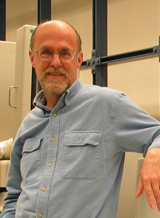 W
WWebb Colby Miller is a professor in the Department of Biology and the Department of Computer Science and Engineering at The Pennsylvania State University.
 W
WYves Moreau is a Professor of Engineering at KU Leuven. Moreau was elected a Fellow of the International Society for Computational Biology (ISCB) in 2018 for outstanding contributions to the fields of computational biology and bioinformatics.
 W
WEugene Wimberly "Gene" Myers, Jr. is an American computer scientist and bioinformatician, who is best known for contributing to the early development of the NCBI's BLAST tool for sequence analysis.
 W
WRuth Nussinov is an Israeli-American biologist who works as a Professor in the Department of Human Genetics, School of Medicine at Tel Aviv University and is the Senior Principal Scientist and Principal Investigator at the National Cancer Institute, National Institutes of Health. Nussinov is also the Editor in Chief for the journal PLOS Computational Biology.
 W
WChristine Anne Orengo is a Professor of Bioinformatics at University College London (UCL) known for her work on protein structure, particularly the CATH database. Orengo serves as president of the International Society for Computational Biology (ISCB), the first woman to do so in the history of the society.
 W
WLior Samuel Pachter is a computational biologist. He works at the California Institute of Technology, where he is the Bren Professor of Computational Biology. He has widely varied research interests including genomics, combinatorics, computational geometry, machine learning, scientific computing, and statistics.
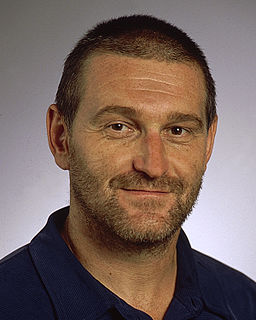 W
WPavel Arkadevich Pevzner is the Ronald R. Taylor Professor of Computer Science and Director of the NIH Center for Computational Mass Spectrometry at University of California, San Diego. He serves on the Editorial Board of PLoS Computational Biology and he is a member of the Genome Institute of Singapore scientific advisory board.
 W
WAviv Regev is a computational biologist and Executive Vice President of Genentech Research and Early Development. She was professor at the Broad Institute of MIT and Harvard and at the Department of Biology of the Massachusetts Institute of Technology, as well as investigator at the Howard Hughes Medical Institute. She and Sarah Teichmann lead the Human Cell Atlas project.
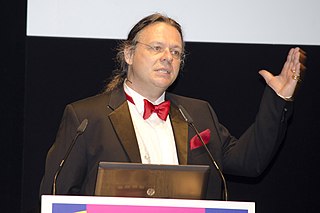 W
WBurkhard Rost is a scientist leading the Department for Computational Biology & Bioinformatics at the Faculty of Informatics of the Technical University of Munich (TUM). Rost chairs the Study Section Bioinformatics Munich involving the TUM and the Ludwig Maximilian University of Munich (LMU) in Munich. From 2007-2014 Rost was President of the International Society for Computational Biology (ISCB).
 W
WAndrej Šali is a computational structural biologist. Since 2003, he has been Professor in the Department of Bioengineering and Therapeutic Sciences at University of California, San Francisco. He also serves as an editor of the journal Structure.
 W
WSteven Lloyd Salzberg is an American computational biologist and computer scientist who is a Bloomberg Distinguished Professor of Biomedical Engineering, Computer Science, and Biostatistics at Johns Hopkins University. He is a member of the Institute of Genetic Medicine at Johns Hopkins School of Medicine, where he is also Director of the Center for Computational Biology.
 W
WChris Sander is a computational biologist based at the Dana-Farber Cancer Center and Harvard Medical School. Previously he was chair of the Computational Biology Programme at the Memorial Sloan–Kettering Cancer Center in New York City. Recently, he moved his lab to the Dana–Farber Cancer Institute and the Cell Biology Department at Harvard Medical School.
 W
WDavid Sankoff is a Canadian mathematician, bioinformatician, computer scientist and linguist. He holds the Canada Research Chair in Mathematical Genomics in the Mathematics and Statistics Department at the University of Ottawa, and is cross-appointed to the Biology Department and the School of Information Technology and Engineering. He was founding editor of the scientific journal Language Variation and Change (Cambridge) and serves on the editorial boards of a number of bioinformatics, computational biology and linguistics journals. Sankoff is best known for his pioneering contributions in computational linguistics and computational genomics. He is considered to be one of the founders of bioinformatics. In particular, he had a key role in introducing dynamic programming for sequence alignment and other problems in computational biology. In Pavel Pevzner's words, "[ Michael Waterman ] and David Sankoff are responsible for transforming bioinformatics from a ‘stamp collection' of ill-defined problems into a rigorous discipline with important biological applications."
 W
WRon Shamir is an Israeli professor of computer science known for his work in graph theory and in computational biology. He holds the Raymond and Beverly Sackler Chair in Bioinformatics, and is the founder and head of the Edmond J. Safra Center for Bioinformatics at Tel Aviv University.
 W
WTemple Ferris Smith is an emeritus professor in biomedical engineering who helped to develop the Smith-Waterman algorithm with Michael Waterman in 1981. The Smith-Waterman algorithm serves as the basis for multi sequence comparisons, identifying the segment with the maximum local sequence similarity, see sequence alignment. This algorithm is used for identifying similar DNA, RNA and protein segments. He was director of the BioMolecular Engineering Research Center at Boston University for twenty years and is now professor emeritus.
 W
WLincoln David Stein is a scientist and Professor in bioinformatics and computational biology at the Ontario Institute for Cancer Research.
 W
WGary Stormo is an American geneticist and currently Joseph Erlanger Professor in the Department of Genetics and the Center for Genome Sciences and Systems Biology at Washington University School of Medicine in St Louis. He is considered one of the pioneers of bioinformatics and genomics. His research combines experimental and computational approaches in order to identify and predict regulatory sequences in DNA and RNA, and their contributions to the regulatory networks that control gene expression.
 W
WSarah Amalia Teichmann is a German scientist who is head of cellular genetics at the Wellcome Sanger Institute and a visiting research group leader at the European Bioinformatics Institute (EMBL-EBI). She serves as director of research in the Cavendish Laboratory, at the University of Cambridge and a senior research fellow at Churchill College, Cambridge.
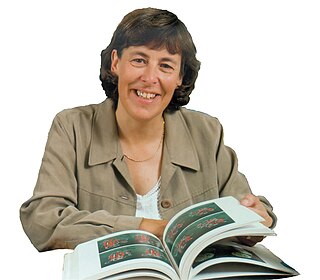 W
WDame Janet Maureen Thornton, is a senior scientist and director emeritus at the European Bioinformatics Institute (EBI), part of the European Molecular Biology Laboratory (EMBL). She is one of the world's leading researchers in structural bioinformatics, using computational methods to understand protein structure and function. She was formerly director of the EBI from October 2001 to June 2015, and played a key role in ELIXIR.
 W
WAnna Tramontano was an Italian computational biologist and chair professor of biochemistry at the Sapienza University of Rome. From 2011 to 2014 she was a member of the Scientific Council of the European Research Council (ERC). She was an associate editor for the journal Bioinformatics from 2005 until 2016 editing papers in the area of structural bioinformatics.
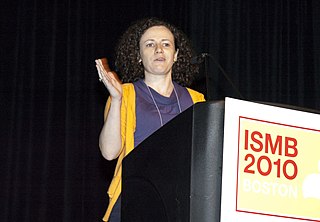 W
WOlga G. Troyanskaya is a Professor in the Department of Computer Science and the Lewis-Sigler Institute for Integrative Genomics at Princeton University and the Deputy Director for Genomics at the Simons Center for Data Analysis at the Simons Foundation in NYC. She studies protein function and interactions in biological pathways by analyzing genomic data using computational tools.
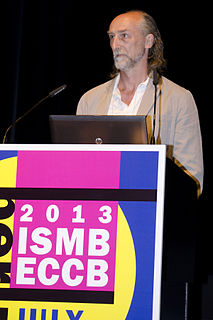 W
WAlfonso Valencia is a Spanish biologist, ICREA Professor, current director of the Life Sciences department at Barcelona Supercomputing Center. and of Spanish National Bioinformatics Institute (INB-ISCIII). From 2015-2018, he was President of the International Society for Computational Biology. His research is focused on the study of biomedical systems with computational biology and bioinformatics approaches.
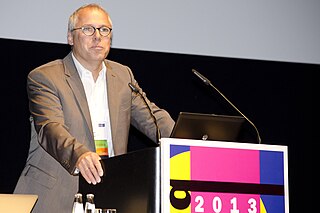 W
WMartin Vingron is an Austrian mathematician working in the fields of bioinformatics and computational biology. Since 2000, he has been Director of the Max Planck Institute for Molecular Genetics.
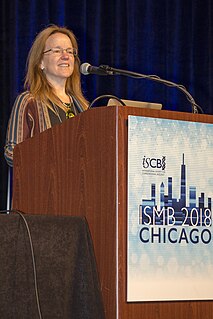 W
WTandy Warnow is an American computer scientist and Grainger Distinguished Chair in Engineering at the University of Illinois at Urbana–Champaign. She is known for her work on the reconstruction of evolutionary trees, both in biology and in historical linguistics, and also for multiple sequence alignment methods.
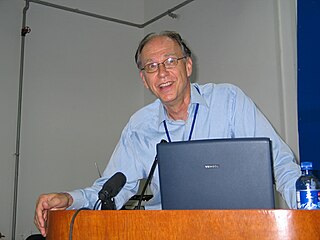 W
WMichael Spencer Waterman is a Professor of Biology, Mathematics and Computer Science at the University of Southern California (USC), where he holds an Endowed Associates Chair in Biological Sciences, Mathematics and Computer Science. He previously held positions at Los Alamos National Laboratory and Idaho State University.
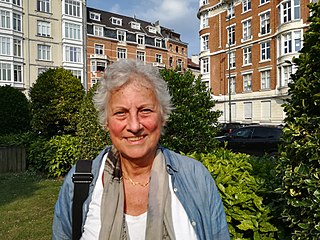 W
WShoshana Wodak is a computational biologist and an organizational leader in the field of protein-protein docking. Wodak was one of the first people to dock proteins together using a computer program.